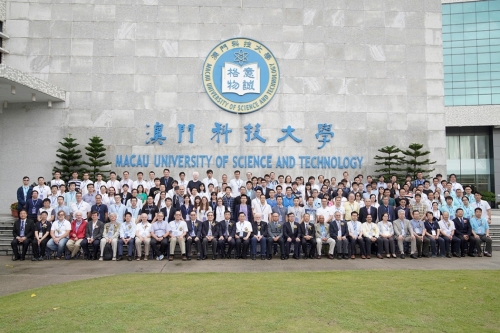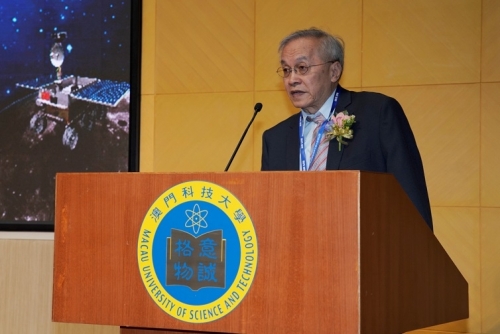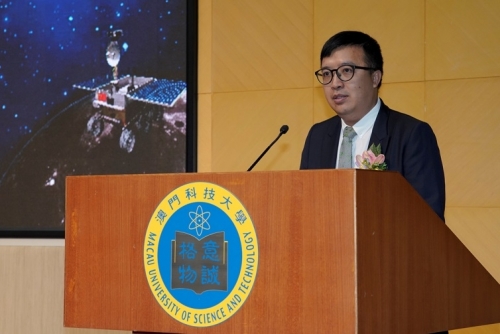The Opening Ceremony of the International Symposium on Lunar and Planetary Science 2018 (ISLPS2018) was held in N101 at Macau University of Science and Technology in the morning of June 13, 2018. Chairman Ma Chi Ngai, Administrative Committee of the Science and Technology Development Foundation of the Macao S.A.R. (FDCT), Deputy Director Chang Kun Hong of the Macao Tertiary Education Services Office, Vice President Jiang Zhi Hong of Macau University of Science and Technology and other guests attended the Ceremony.
The ISLPS is jointly organized by the Space Science Institute of MUST and the China University of Geosciences in Wuhan. It is a biennial academic event of the international planetary sciences community sponsored by FDCT and MUST Foundation. The first ISLPS conference was held in 2014, and this year marks the third meeting of the symposium. The ISLPS 2018 takes place from June 13 to 15, 2018; the program covers topics such as terrestrial planet, gas planets and systems, small solar system body, space environment, and deep space exploration technology. The ISLPS 2018 is the most internationally participated and most content-wise cutting-edge event since the commencement of China’s planetary science development; it has collected over 150 abstracts from more than 160 speakers from 12 countries and regions (including all major space science powers); academic leaders, renowned experts, and scholars from 60 institutions gave speeches and presentations.

Group photo of the ISLPS 2018 participants
At the Opening Ceremony, Professor Ip Wing Huen, Academician of the Taiwan Academia Sinica and Distinguished Professor of MSUT, gave a welcome speech. Academician Ip welcomed all the participants of the ISLPS 2018 and gave an introduction to the history of the Symposium. He mentioned that the original idea behind the ISLPS was to provide a platform for lunar and planetary scientists in China to interact and to exchange information with each other and with their international colleagues. As was shown by the program of the ISLPS 2018, the Chinese scholars would demonstrate the important progress in lunar and deep space exploration since the Chang'e-1 mission, and propose mission targets to explore next, including the Mars, Asteroids, Jupiter and even further places of the solar system. Scholars from other countries and regions, including the USA, Europe, India, Japan, and South Korea, would also report deep space exploration missions and achievements of the corresponding regions. Planetary exploration and research in the future would contribute to a world stage of international cooperation, which coincides with “Peace in Earth and Collaboration in Space”, motto of the Space Science Institute, MUST

Prof. Ip Wing Huen
Afterwards, Vice President Jiang Zhi Hong spoke on behalf of MUST. He noted that the Space Science Institute committed to cultivation of professional talents in planetary sciences, has published over 550 papers in the planetary science area and established the Lunar and Planetary Science Laboratory (LPSL) – the first offshore co-laboratory of Chinese Academy of Sciences Key Laboratory Lunar and Deep Space Exploration, in 2014. With only three years of development, and with the help of the Chinese Academy of Sciences and relevant institutes, and the support from FDCT, LPSL has made progresses in laboratory development and research, improvement in academic standard, elevation in its international profile, and impressive achievements in academic research. In 2016, “Scientific Discoveries of Multiband Lunar Probing Data of the Chang’e Project” has won the first-class prize of the Natural Sciences Awards by the Macao S.A.R. Government. Last year, the Laboratory application for a State Key Laboratory in Lunar and Planetary Science and has passed the preliminary review. Once established, the state key laboratory would become another high-level science and technology platform of Macau and MUST, in providing high-quality backup forces for China to catch up with the international community in planetary sciences.

Vice President Jiang Zhi Hong
Chairman Ma Chi Ngai addressed the Opening Ceremony on behalf of the FDCT. He asserted that although MUST has only eighteen years of development, it has developed very rapidly. Not only the Faculty of Chinese Medicine has established Macau’s first state key laboratory, but also the Space Science Institute would soon house another state key laboratory. He believed that, with the fast development of planetary science, with the great support by the FDCT, MUST’s Space Science Institute is on its way to yield greater achievements and make more contributions to academic research in planetary science and communications between the Chinese planetary science community and the world planetary science peers.

Chairman Ma Chi Ngai
Finally, the officiating guests of the ISLPS 2018 presented souvenirs to participating experts, including the four keynote speakers: Professor James W. Head, Louis Distinguished Professor of Brown University, Fellow of the American Academy of Arts and Sciences and Geology Advisor for the Lunar Probing Program of the USA; Professor Sushil Atreya, Professor of Climate and Space Sciences and Engineering of Michigan University and member of the scientist team of the Curiosity rover; Director General Chi Wang of the National Space Science Center, Chinese Academy of Sciences; and Director Yan Geng from the Deep Space Exploration Division of the Lunar Exploration and Space Program Center. And also two invited speakers: Professor Anil Bhardwaj, Director of the Physical Research Laboratory, the Department of Space, India and Professor Kyeong J. Kim, Korea Institute of Geoscience and Mineral Resources.





